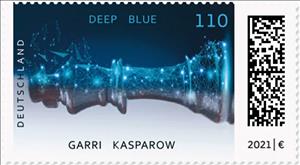Stamp: Deep Blue Defeats Kasparov (Germany, Federal Republic 2021)
Deep Blue Defeats Kasparov (Germany, Federal Republic 2021)
01 March (Germany, Federal Republic ) within release Deep Blue Defeats Kasparov goes into circulation Stamp Deep Blue Defeats Kasparov face value 110 Euro cent
| Stamp Deep Blue Defeats Kasparov in catalogues | |
|---|---|
| Michel: | Mi: DE 3595 |
Stamp is horizontal format.
Also in the issue Deep Blue Defeats Kasparov:
- Stamp - Deep Blue Defeats Kasparov face value 110;
- Mini Sheet - Deep Blue Defeats Kasparov face value 10*110;
Stamp Deep Blue Defeats Kasparov it reflects the thematic directions:
Chess is usually played by two players (called chess players) against each other. It is also possible for one group of chess players to play against another or against one player; such games are often called consultation games. In addition, there is the practice of simultaneous play sessions, when several opponents play against one strong player, each on a separate board.
The rules of the game were basically developed by the 15th century; In modern official tournaments, the rules of the International Chess Federation[6] are applied, which regulate not only the movement of pieces, but also the rights of the judge, the rules of behavior of players and time control. A game played remotely - for example, by correspondence, by telephone or via the Internet - has special rules. There are many variants of chess that differ from classical ones: with non-standard rules, pieces, board sizes, etc. The corresponding section of chess composition is fairy chess. Some aspects of the game of chess are studied in mathematics (for example, the classic “Knight's Move Problem” and “Eight Queens Problem”), including through computer simulation. Chess is usually played by two players (called chess players) against each other. It is also possible for one group of chess players to play against another or against one player; such games are often called consultation games. In addition, there is the practice of simultaneous play sessions, when several opponents play against one strong player, each on a separate board.
The rules of the game were basically developed by the 15th century; In modern official tournaments, the rules of the International Chess Federation[6] are applied, which regulate not only the movement of pieces, but also the rights of the judge, the rules of behavior of players and time control. A game played remotely - for example, by correspondence, by telephone or via the Internet - has special rules. There are many variants of chess that differ from classical ones: with non-standard rules, pieces, board sizes, etc. The corresponding section of chess composition is fairy chess. Some aspects of the game of chess are studied in mathematics (for example, the classic “Knight's Move Problem” and “Eight Queens Problem”), including through computer simulation.
A computer is a machine that can be programmed to automatically carry out sequences of arithmetic or logical operations (computation). Modern digital electronic computers can perform generic sets of operations known as programs. These programs enable computers to perform a wide range of tasks. The term computer system may refer to a nominally complete computer that includes the hardware, operating system, software, and peripheral equipment needed and used for full operation; or to a group of computers that are linked and function together, such as a computer network or computer cluster.


